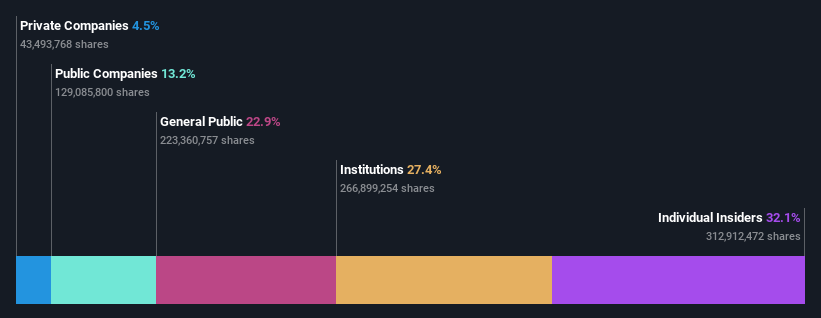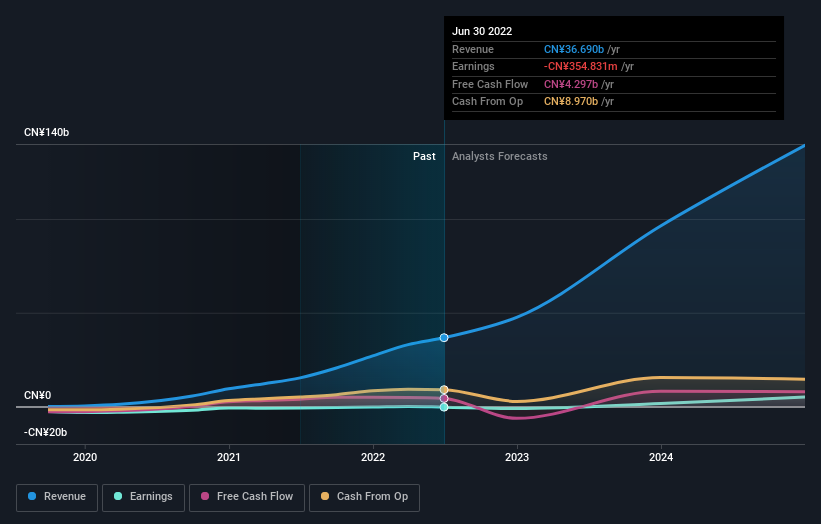With 32% ownership, Li Auto Inc. (NASDAQ:LI) insiders have a lot riding on the company's future
Every investor in Li Auto Inc. (NASDAQ:LI) should be aware of the most powerful shareholder groups. And the group that holds the biggest piece of the pie are individual insiders with 32% ownership. In other words, the group stands to gain the most (or lose the most) from their investment into the company.
So it follows, every decision made by insiders of Li Auto regarding the company's future would be crucial to them.
Let's delve deeper into each type of owner of Li Auto, beginning with the chart below.
Check out our latest analysis for Li Auto
What Does The Institutional Ownership Tell Us About Li Auto?
Institutional investors commonly compare their own returns to the returns of a commonly followed index. So they generally do consider buying larger companies that are included in the relevant benchmark index.
We can see that Li Auto does have institutional investors; and they hold a good portion of the company's stock. This can indicate that the company has a certain degree of credibility in the investment community. However, it is best to be wary of relying on the supposed validation that comes with institutional investors. They too, get it wrong sometimes. When multiple institutions own a stock, there's always a risk that they are in a 'crowded trade'. When such a trade goes wrong, multiple parties may compete to sell stock fast. This risk is higher in a company without a history of growth. You can see Li Auto's historic earnings and revenue below, but keep in mind there's always more to the story.
Li Auto is not owned by hedge funds. The company's CEO Xiang Li is the largest shareholder with 24% of shares outstanding. For context, the second largest shareholder holds about 13% of the shares outstanding, followed by an ownership of 6.8% by the third-largest shareholder. Interestingly, the third-largest shareholder, Xing Wang is also a Member of the Board of Directors, again, indicating strong insider ownership amongst the company's top shareholders.
On looking further, we found that 51% of the shares are owned by the top 5 shareholders. In other words, these shareholders have a meaningful say in the decisions of the company.
While it makes sense to study institutional ownership data for a company, it also makes sense to study analyst sentiments to know which way the wind is blowing. There are plenty of analysts covering the stock, so it might be worth seeing what they are forecasting, too.
Insider Ownership Of Li Auto
The definition of company insiders can be subjective and does vary between jurisdictions. Our data reflects individual insiders, capturing board members at the very least. The company management answer to the board and the latter should represent the interests of shareholders. Notably, sometimes top-level managers are on the board themselves.
Insider ownership is positive when it signals leadership are thinking like the true owners of the company. However, high insider ownership can also give immense power to a small group within the company. This can be negative in some circumstances.
It seems insiders own a significant proportion of Li Auto Inc.. It is very interesting to see that insiders have a meaningful US$5.5b stake in this US$17b business. Most would be pleased to see the board is investing alongside them. You may wish to access this free chart showing recent trading by insiders.
General Public Ownership
With a 23% ownership, the general public, mostly comprising of individual investors, have some degree of sway over Li Auto. This size of ownership, while considerable, may not be enough to change company policy if the decision is not in sync with other large shareholders.
Private Company Ownership
It seems that Private Companies own 4.5%, of the Li Auto stock. It's hard to draw any conclusions from this fact alone, so its worth looking into who owns those private companies. Sometimes insiders or other related parties have an interest in shares in a public company through a separate private company.
Public Company Ownership
Public companies currently own 13% of Li Auto stock. This may be a strategic interest and the two companies may have related business interests. It could be that they have de-merged. This holding is probably worth investigating further.
Next Steps:
I find it very interesting to look at who exactly owns a company. But to truly gain insight, we need to consider other information, too. Take risks for example - Li Auto has 1 warning sign we think you should be aware of.
Ultimately the future is most important. You can access this free report on analyst forecasts for the company.
NB: Figures in this article are calculated using data from the last twelve months, which refer to the 12-month period ending on the last date of the month the financial statement is dated. This may not be consistent with full year annual report figures.
Have feedback on this article? Concerned about the content? Get in touch with us directly. Alternatively, email editorial-team (at) simplywallst.com.
This article by Simply Wall St is general in nature. We provide commentary based on historical data and analyst forecasts only using an unbiased methodology and our articles are not intended to be financial advice. It does not constitute a recommendation to buy or sell any stock, and does not take account of your objectives, or your financial situation. We aim to bring you long-term focused analysis driven by fundamental data. Note that our analysis may not factor in the latest price-sensitive company announcements or qualitative material. Simply Wall St has no position in any stocks mentioned.
Join A Paid User Research Session
You’ll receive a US$30 Amazon Gift card for 1 hour of your time while helping us build better investing tools for the individual investors like yourself. Sign up here

 Yahoo Finance
Yahoo Finance 

